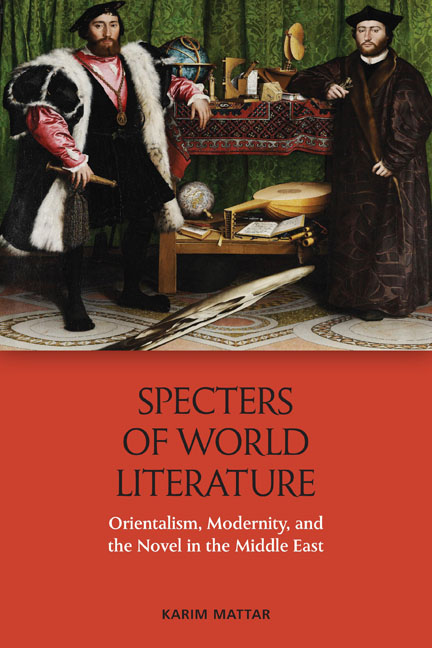Book contents
- Frontmatter
- Contents
- Preface
- Acknowledgments
- Note on Transliterations
- Introduction: Towards a Spectral Theory of World Literature
- I The Worlding of “Literature” in the Middle East
- II The Middle Eastern Novel and the Spectral Life-World of Modernity
- Conclusion: Futures of Spectrality
- Bibliography
- Index
5 - Women in the Literary Marketplace: The Anglophone Iranian Novel and the Feminist Subject
Published online by Cambridge University Press: 20 October 2020
- Frontmatter
- Contents
- Preface
- Acknowledgments
- Note on Transliterations
- Introduction: Towards a Spectral Theory of World Literature
- I The Worlding of “Literature” in the Middle East
- II The Middle Eastern Novel and the Spectral Life-World of Modernity
- Conclusion: Futures of Spectrality
- Bibliography
- Index
Summary
[…] English will certainly take its place in history as the world's first genuinely global language.
David Crystal, “Diversity? We ain't seen nothing yet!”What seems to me to be happening is that those peoples who were once colonized by the language are now rapidly remaking it, domesticating it, becoming more and more relaxed about the way they use it—assisted by the English language's enormous flexibility and size, they are carving out large territories for themselves within its frontiers.
Salman Rushdie, Imaginary HomelandsIn the last several decades, the anglophone Arab or Middle Eastern novel has emerged as its own distinct branch of multicultural writing in Britain and the United States, alongside other comparably “cosmopolitan” or “exotic” variants of this literary trend. Since the 1980s, English-language literary fiction by immigrant, exilic, second-or third-generation, mixed heritage, or otherwise diasporic writers of Arab or other Middle Eastern descent and now living in these countries has been steadily on the rise in terms of its quantity, commercial success, popular and critical appreciation, recognition in international award culture, presence in school and university curricula, and so forth. The most prominent of the authors associated with this trend include: Leila Aboulela, Diana Abu-Jaber, Susan Abulhawa, Etel Adnan, Rabih Alameddine, Anita Amirrezvani, Nadeem Aslam, Fadia Faqir, Nuruddin Farah, Rawi Hage, Laila Halaby, Mohsin Hamid, Mohammed Hanif, Khaled Hosseini, Randa Jarrar, Porochista Khakpour, Hanif Kureishi, Laila Lalami, Hisham Matar, Claire Messud, Farnoosh Moshiri, Elif Shafak, Kamila Shamsie, Dalia Sofer, and Ahdaf Soueif, among others.
In itself, what I will broadly refer to as the genre of the “anglophone Middle Eastern novel” might be and indeed has been traced back to the early twentieth century and the pioneering writings of especially Ameen Rihani and Khalil Gibran (both of whom were Lebanese-American). However, it was only from the 1980s that it really came into its own in the sorts of ways mentioned above. This is due to the same political, social, and cultural developments as those discussed in the Introduction to explain the rise of the Middle Eastern novel in general to worldly prominence at the time, as well as other influences specific to the case.
- Type
- Chapter
- Information
- Specters of World LiteratureOrientalism, Modernity, and the Novel in the Middle East, pp. 260 - 299Publisher: Edinburgh University PressPrint publication year: 2020



